Chapter 6:
The Room That Remembered Too Much
Lantern Inn Chronicles
There was a door in the far corner of the inn — past the guest rooms, down the quiet hallway where the floorboards whispered underfoot. It sat flush against the wall, nearly blending into the shadows cast by the eaves above. Unlike the others, it bore no nameplate, no woven curtain, no inked blessing on its frame. Just a faded, ornamental lock rusted around the edges, and a faint scent — not unpleasant, but hard to place. Like dried lavender kept in a drawer too long. Or old paper warmed by the sun.
Kaito had walked past it a dozen times. Maybe more. It was easy to overlook, like an old book you never quite pulled from the shelf.
But today — the door noticed him.
He wasn’t doing anything unusual. Just carrying fresh linens down the hallway, humming without sound. But as he passed, the latch clicked, and the door creaked ajar by no more than an inch.
A breath.
A whisper.
He stopped.
Felt it before he saw it — the pull. Not quite fear. Not quite curiosity. Just… gravity. Like something inside wanted to be seen.
He set the linens down gently and pushed the door open.
Inside, dust floated like slow snowfall, drifting in the amber light of a single hanging lantern. The room was still. Heavy with quiet. Not silence — but the kind of hush that comes after someone stops speaking.
The space was larger than he expected. Wooden shelves lined every wall, some reaching nearly to the ceiling. Each one was filled with small objects, meticulously arranged. Nothing flashy. Nothing valuable. And yet, each item seemed to hum softly in the stillness — like it remembered who last touched it.
A cracked watch with its second hand paused forever between ticks.
A paper crane, yellowed at the folds, the ink on its wings faded.
A mirror, half-broken, reflecting only the corners of the room.
A child’s drawing, vibrant and crinkled.
A scarf — soft blue — with one end stiff and darkened by old, dried blood.
Each object had a tag, handwritten and tied delicately with red thread. Just names. No explanations. And yet, Kaito felt them. Felt them all. These weren’t things. They were echoes.
He took a careful step inside.
“You’re not supposed to be here.”
The voice was quiet. Crisp, like the turning of a page.
He turned.
A woman stood near the far shelf. Her black hair was long and tied into a neat braid. She wore a deep indigo kimono with sleeves too formal for the warmth of the room. Her eyes were clear, sharp — not unkind, but weighing.
Kaito bowed instinctively. “I didn’t mean to intrude. The door… it opened.”
She studied him. For a long, still moment.
“That happens sometimes,” she said. “When someone’s memories are louder than the lock.”
Her name was Ayame. She introduced herself as the memory keeper.
“This is where what’s left behind comes to wait,” she explained, gesturing gently toward the shelves. “Each of these belonged to someone who passed through the inn. Most moved on. But the last pieces — the ones too stubborn or too quiet — remain. They hold regret. Longing. Sometimes, love.”
She walked slowly, guiding him like a docent in a forgotten museum.
“This comb belonged to a woman who never forgave her mother,” she said, touching it lightly. “The tension is still in the teeth.”
“That torn letter — from a boy who died before he could post it. He wrote it to someone he never confessed to.”
“That doll in the glass case? A promise unkept. She said she’d come back. She never did.”
Kaito’s eyes stopped on a small item, neatly placed near the back.
A blue tie.
The fabric was worn around the edges, its blue hue dulled with age and stained slightly near the tip — like it had been caught once in a cup of coffee or brushed against a desk drawer too many times. Yet the moment Kaito’s eyes fell on it, something inside him stirred, like a door long closed had creaked open just an inch. The tie rested neatly on a velvet tray near the back of the room, almost tucked away, almost shy. And there, tied gently with a red thread, the name tag read: Tanaka Shūji.
Kaito froze.
His breath caught in his throat, and the world around him seemed to mute.
“Tanaka-san…” he whispered, voice barely audible. “My mentor…”
He reached out slowly, reverently, like the tie might disappear if he touched it too quickly. His fingertips brushed the fabric — coarse, familiar, heartbreakingly real. A tremble passed through his hand as if the tie carried weight beyond its fibers. His chest tightened with the weight of memory.
“He died,” Kaito said softly, as if confessing it for the first time. “During the pandemic. He was the only one who ever called me by my name. Everyone else just said, ‘Hey, you’ or nothing at all.”
He laughed under his breath, but the sound cracked halfway. It wasn’t really laughter. It was the echo of a grief he hadn’t made space for.
Ayame stood nearby, silent. She didn’t press him, didn’t offer comfort too soon. She simply bore witness, her presence like a gentle stillness in the air — quiet, grounding, patient.
Kaito lifted the tie to his chest and inhaled. And there it was — the faint, unmistakable scent of old vending-machine coffee and cheap cologne. It hit him so vividly that he staggered back a step.
A memory surged forward without permission.
Flash.
A cramped, tired office tucked into the corner of a dull concrete building. The humming of an ancient desktop fan. The tick of the clock above the HR bulletin board.
Tanaka-san, sleeves rolled up, a grin spread lopsided across his face, handed Kaito a steaming cup of vending-machine coffee. “Don’t look so surprised,” he’d said. “It’s not poisoned. Just bad.”
Kaito had taken it with both hands, bowing slightly out of habit. “Thank you, Tanaka-san.”
Tanaka had chuckled. “You’re too polite, Kaito. You gotta make a little noise, or they’ll walk over you like office carpet.”
That had made Kaito laugh — an unexpected, bright sound that startled even himself.
Tanaka clapped him on the back, a little too hard. “Even silence has value. Just make sure yours doesn’t become a tomb, alright?”
The memory faded, leaving behind an ache like bruised ribs. Kaito exhaled shakily, blinking as though he’d come out of a dream.
“He never got to retire,” Kaito murmured, fingers tightening around the tie. “Said we’d go fishing after his last quarter. He had it all planned — he even picked the river. I… I didn’t even know he’d died until weeks later. No one thought to tell me. He was just… gone.”
Ayame stepped closer, kneeling beside him. Her fingers hovered above the tray where the tie had rested.
“Then maybe,” she said gently, “this was waiting for you. Not just the tie — the goodbye.”
Together, they placed the tie on the center altar — a beautifully crafted, lacquered wooden table surrounded by embroidered floor cushions. The space radiated a sacred sort of stillness, as though the air itself understood the act.
Kaito knelt. His hands rested in his lap, his eyes on the tie. The flickering lantern above cast shadows that danced across the wooden walls. He stayed there for a long time — hours, maybe — speaking softly, not to Ayame, but to the man who had once seen him when the rest of the world looked through him.
“Thank you, Tanaka-san,” he whispered. “For the coffee. For the advice. For calling me Kaito when I had no name.”
He paused. His throat ached with words that had never been spoken.
“I’m sorry… for not visiting. For disappearing into my own silence. For not saying goodbye. I think… I didn’t know how. Maybe I still don’t.”
Ayame remained beside him, unmoving, a steady presence amid the waves of memory.
“I hope,” Kaito said, voice barely holding steady, “if there’s water wherever you are, you’re casting lines in peace. And that the fish are biting.”
A long silence followed. Then, as if in answer, the lantern above dimmed slightly — not flickering, but softening, like an exhale after a long-held breath.
The tie shimmered.
Just once.
A gentle, breath-like glow radiated from it for a moment, illuminating Kaito’s face in warm gold, before it slowly faded — not vanishing, but releasing. A hush fell across the room that didn’t feel like absence. It felt like closure.
Later that night, after the inn had quieted again and the stars gathered like old friends above the rooftop, Kaito found Ayame outside. She stood beneath the wind chimes, her silhouette outlined in silver moonlight. The wind whispered through the trees — soft, thoughtful.
Kaito stepped beside her, folding his arms across his chest.
“Do you do this for everyone?” he asked.
Ayame didn’t turn to look at him. She simply watched the stars.
“Only the ones who listen like you do,” she said.
Kaito looked back toward the hallway, imagining the memory room now gently sealed again — waiting for the next voice that might find it.
“I think I spent most of my life surrounded by forgotten things,” he said, his voice low. “Forgotten people. And I didn’t even notice.”
Ayame finally looked at him — not smiling, but softened, like someone watching the tide turn.
“You’re noticing now,” she said.
Kaito nodded slowly, a hint of peace curling at the corners of his lips.
“I guess… I’m finally here.”
The wind passed through the inn like a breath from the past — soft, patient, and old. Inside, the memory room no longer sighed with longing, but whispered with remembrance.
And on the shelf where the tie had once rested, the tray remained.
Empty.
But no longer waiting.




Please sign in to leave a comment.